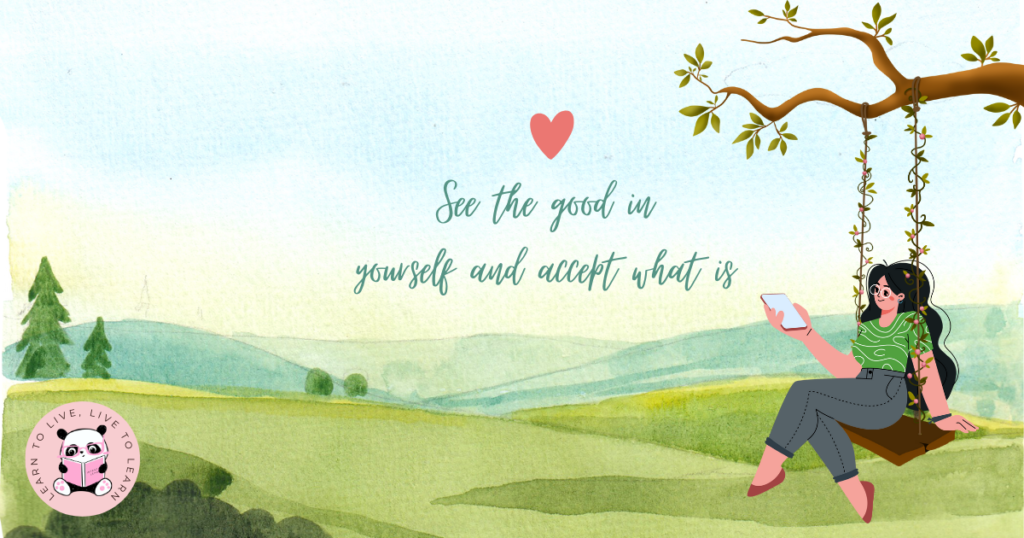How to Overcome Fear of Judgment and Embrace Authenticity
Written by Michelle Ong | June 5, 2024 | Growth

Explore practical principles and mindsets to help you stop caring about others’ opinions and let go of that pressure.
In our interconnected digital world, we’re constantly bombarded with information that can overwhelm us and pressure us to conform to societal ideals. Scrolling through social feeds rewires our brains, making us overly sensitive to others’ opinions. We stress about projecting an acceptable image and often find ourselves overthinking how we’re perceived.
This anxiety can lead to frustration and disappointment, especially when we fail to meet expectations. Negative feedback can harm our self-esteem, creating a cycle of mental stress and sadness.
While we can’t completely disconnect from digital influences or the people around us, we can learn how to overcome the fear of judgment and embrace our authenticity. Caring isn’t bad; it’s caring too much that can be harmful. We must be selective about what we focus on and redirect our attention to what truly matters.
In this post, we’ll explore practical principles and mindsets to help you stop worrying about others’ opinions and embrace your true self.
1. Limits Of Control
“You can’t control how others see you, so just be yourself and let your authenticity shine.”
To live a good life, it’s crucial to understand what we can and cannot control. We can manage our thoughts and actions, but we can’t dictate others’ opinions or actions. While it’s natural to care about how others see us, overly focusing on their views can lead to anxiety and harm our well-being.
The Stoic concept of amor fati, meaning “love of fate,” encourages us to accept our reality as it is, viewing each situation as an opportunity for growth rather than labeling it as good or bad. Recognizing the limits of our control is key. Seeking validation from outside sources will always make us feel unfulfilled.
Instead of worrying about judgment, we should look inward, accepting people and situations as they are. While this may seem simple, it’s challenging to embrace. Many of us cling to illusions about what we desire, but learning how to overcome the fear of judgment can help us embrace our authenticity and find true fulfillment.
2. Paradox Of Control
There’s this paradox: the more you try to control something, the more it slips out of control. The harder you try, the worse it gets, and eventually, what you try to control ends up controlling you. It’s like trying to hold water in your hands—impossible and against nature.
Trying to control everything is like swimming against the tide. It might feel comforting and give a false sense of security, but it doesn’t work. We become too reliant on this illusion of control and aren’t prepared for the inevitable consequences when things don’t go as planned.
3. I Am Solely Responsible
When we care too much about what others think, we’re really expecting a lot from them, which isn’t fair. We’re each responsible for our thoughts, feelings, and happiness—no one else.
So, with this understanding that your happiness doesn’t rely on others’ approval, then it naturally follows that you should not worry too much about others’ opinions of you. Instead, focus your energy on being accountable for your own thoughts and actions.
4. Self-acceptance
“Your value doesn’t decrease based on someone’s inability to see your worth.”
Society teaches us to be self-conscious, to chase ideals, and to look to authority figures for what’s acceptable. This is amplified by beauty standards, shaping how we see ourselves and compare with others. We become judgmental and try to project an image we think others expect, fearing rejection. In doing so, we actually reject our true selves.
The most important relationship is the one we have with ourselves. If we can’t accept ourselves, how can we expect others to accept us? Self-acceptance means being okay with who we are. People connect not with perfection, but with honesty and authenticity.
“The real difficulty is to overcome how you think about yourself.”
Maya Angelou
Don’t aim to be the most interesting person in the room—that just shows you’re too focused on yourself. Instead, be interested in others. Shift the focus away from yourself. This is the true mark of self-confidence. When you feel fulfilled within, you don’t need others’ attention and approval to feel complete.
I used to associate solitude with discomfort and believed that only outcasts were alone. Although I disliked being alone, I had an irrational fear of criticism and rejection, which made it hard to step out of my comfort zone. The lack of courage to embrace the discomfort of being vulnerable and real conflicted with my desire to connect with others. This stemmed from a deep lack of self-acceptance and the belief that gaining others’ acceptance was the right way to live.
Fortunately, I came to my senses, reduced my dependence on others, and discovered the benefits and joy of uninterrupted alone time. These moments of introspection are crucial for developing inner strength and self-reliance.
5. Spotlight Effect
Many of us feel self-conscious because of something called the spotlight effect. This means we think everyone is noticing and judging us as much as we judge ourselves. But that’s not true. Everyone is different, multi-faceted, and constantly changing, influenced by their own environments.
We often spend too much time worrying about how others perceive us, but the reality is that most people are focused on their own lives and concerns. They rarely have time to think about what we’re doing or how we feel, unless our actions directly affect them.
So, there’s no point in wasting energy trying to impress or please everyone. We need to get out of our own heads and stop those self-conscious thoughts. Not everything is about you. Instead of worrying about how others see you, focus on being true to yourself and living authentically.
6. Be Slow To Judge
If you’re overly concerned about what others think of you, you might be subconsciously judging others too. Instead, practice compassion and be slow to judge. Try seeing situations from different perspectives. Remember, how others think and feel is beyond our control. Negative judgments or behaviors from others often reflect their own issues, not yours.
Learn to be indifferent to such judgments and let them go. Adopt the Taoist principle of wu wei, which means going with the flow and releasing preconceived expectations. Understand that others’ opinions are just opinions; they don’t define you unless you let them.
7. Self-respect
“Self-respect, self-worth, and self-love, all start with self. Stop looking outside of yourself for your value.”
Rob Liano
My past self, like many others, had a strong desire to please others and avoid conflicts, always worrying about how people perceived me. I wasted a lot of time replaying criticisms and thinking about what-ifs. Craving companionship and wanting to be liked, but held back by the fear of rejection and conflict, led me to live life passively and “not make waves.”
The reality is that people tend to respect you in proportion to the respect you show yourself. So, if you want respect from others, start by respecting yourself. Caring too much about others’ opinions and criticisms means giving away your control and power to them, eroding their respect for you.
“Care about what other people think and you will always be their prisoner.”
Lao Tzu
Respecting yourself means being confident in your choices and decisions, knowing what is right for you, understanding what you deserve, and recognizing your rights. It involves keeping negative thoughts and self-doubt at bay, prioritizing your needs and setting boundaries. Self-respect isn’t about being self-centered or selfish; it’s about self-love and staying true to your beliefs and values.
Don’t live passively according to others’ expectations or whims. Get your inner house in order, and this will show in your actions and behavior, naturally commanding respect from those you interact with.
8. Criticisms
Having self-respect is crucial to stop worrying excessively about what others think of you. Avoid being overly hard on yourself. Treat yourself with the same respect you give to others.
Choose who to respect by considering the track record of those who offer harsh critiques. Some people criticize just for the sake of it, so don’t waste your time worrying about their opinions. Criticizing is easy, but taking action is hard. If someone criticizes you but lacks experience in the issue you’re facing, don’t be overly bothered by their opinion. As a rule, don’t take criticism from people you wouldn’t seek advice from. If you don’t respect the person, why let their opinions about you bother you?
Judge if there’s truth in their feedback. If you’ve been too stubborn or narrow-minded to see when you’re wrong, do yourself a favor by admitting it and changing for the better. I know it’s not easy. But be grateful to those who give you constructive criticism.
The quality of your relationships affects the quality of your life. To improve both, you need to control your emotions and your mind. Learn to separate nonsense from truth. If criticisms are baseless, ignore them.
9. All Things Shall Pass
The fear of rejection is a big deal that many struggle with. I used to avoid it like the plague, believing my mistakes would lead to ridicule and a lasting label as the one who messed up. This fear paralyzed me into passivity and non-action.
These negative thoughts stemmed from erroneous assumptions and unfair expectations I placed on myself, based on perceived standards and assuming the worst of others. It’s like when a leaf falls into a calm lake and makes ripples—I let my negative thoughts disturb my peace of mind. And ended up reacting when I shouldn’t have.
When faced with difficult situations, it is crucial to pause and resist the temptation to react instantly. Allow yourself to observe your thoughts and emotions, like a bystander. Let them pass by calmly and stay composed, regardless of the outcome. Remember, blaming others only gives them power over you, and blaming yourself will only make you feel worse and reinforce negative thoughts.
A helpful tip is not taking yourself too seriously. Learn to see the positive or even amusing side of things. Humor can help make the best out of any situation.
The Zen philosophy of wabi sabi imparts the wisdom of living in the present moment and embracing the fact that everything in life is transient. It teaches us that things come and go, and that’s okay.
How I Let Go
“The moment you stop caring what other people think, is the moment you start being yourself.”
After gaining awareness of and understanding the principles and mindsets outlined above, my negative self-talk has reduced. But that was only the beginning. The litmus test was putting these theories into practice in my daily life.
I then set out uncovering my ikigai , the priorities to focus on, and set personal goals. Learning and integrating self-care in my daily routine are major contributors to my transformation. Allocating time for hobbies prevented unnecessary worries from filling my days.
Research suggests that just 12 minutes of daily meditation can reduce the size of the fear center, the amygdala, in our brain by 25%, so I incorporated affirmations and meditation to promote positive self-talk and calmness. Gratitude journaling and daily introspection helped me better appreciate kindness and find peace.
This journey required time, effort, and determination. Looking back, I realized the importance of not giving up or letting others’ opinions sway me easily. It’s crucial to stand my ground and give myself credit. Eventually, I grew comfortable presenting my true self to the world, making the journey worthwhile.
I hope you found this article helpful! If you did, please pin and share it with your family and friends!


